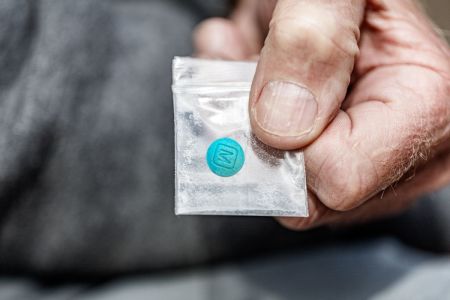Fentanyl vaccine may be 'game changer' in fighting opioid crisis, researchers say

Researchers at the University of Houston say they have developed a vaccine that could significantly impact the nation’s opioid epidemic by blocking synthetic fentanyl from entering the brain, eliminating the drug’s “high.”
According to information the university provided to The Christian Post, researchers believe the vaccine could act as a “relapse prevention agent” for those struggling to overcome opioid addiction, as an estimated 80% of people dependent on the drug suffer a relapse.
The Department of Defense funded the study through the Alcohol and Substance Abuse Disorders Program managed by RTI International’s Pharmacotherapies for Alcohol and Substance Use Disorders Alliance. The program has funded the lab for several years to aid in the creation of an anti-fentanyl vaccine.
According to a May report from the U.S. Centers for Disease Control and Prevention, overdose deaths from opioids increased from over 70,000 in 2020 to over 80,000 in 2021. Over 71,000 of those 2021 opioid deaths came from overdoses on synthetic fentanyl, up from around 57,000 in 2020.
The CDC reported last November that fentanyl is the leading cause of death among U.S. adults ages 18-45. The organization also warns that the drug is exponentially more potent than heroin and morphine and that ingesting just 2 milligrams can be deadly.
“We believe these findings could have a significant impact on a very serious problem plaguing society for years — opioid misuse,” Colin Haile, the study’s lead author, said in a statement.
“Our vaccine is able to generate anti-fentanyl antibodies that bind to the consumed fentanyl and prevent it from entering the brain, allowing it to be eliminated out of the body via the kidneys. Thus, the individual will not feel the euphoric effects and can ‘get back on the wagon’ to sobriety.”
The researchers published their findings in the Pharmaceutics journal last month, noting that the vaccine did not appear to cause any adverse side effects in the rats used for lab studies. Within the coming months, the team plans to manufacture a clinical-grade vaccine and test it on humans.
The vaccine contains an adjuvant called dmLT, which is derived from E. coli, developed by collaborators at the Tulane University School of Medicine, according to the report. An adjuvant boosts the immune system’s response to vaccines, which is reportedly necessary for anti-addiction vaccines.
“The anti-fentanyl antibodies were specific to fentanyl and a fentanyl derivative and did not cross-react with other opioids, such as morphine. That means a vaccinated person would still be able to be treated for pain relief with other opioids,” Haile said in the university’s press release.
Therese Kosten, a co-author of the study, believes the new vaccine could be a “game-changer.” Kosten is also a professor of psychology and director of the Developmental, Cognitive & Behavioral Neuroscience program at the university.
“Fentanyl use and overdose is a particular treatment challenge that is not adequately addressed with current medications because of its pharmacodynamics and managing acute overdose with the short-acting naloxone is not appropriately effective as multiple doses of naloxone are often needed to reverse fentanyl’s fatal effects,” Kosten said.
Dr. Nora Volkow, director of the National Institute on Drug Abuse, commented on the study in a Thursday statement to CP, noting that the preclinical trials were done on rats. Volkow added that researchers behind the study will need to conduct "randomized, controlled studies" on people with opioid use disorder to further analyze the safety and efficiency of the vaccine.
If proven to be effective, Volkow said a fentanyl vaccine "could be another important and lifesaving option for patients with opioid use disorder."
"We need to research and develop as many effective tools as possible to combat this devastating crisis, and people with substance use disorders deserve to have a range of treatment options available to them," Volkow wrote.
The NIDA director emphasized that three FDA-approved medications currently exist to treat opioid use disorder, but they are "underutilized" and "underprescribed to patients who need them."
"Only half of addiction treatment facilities offer any of these medications (methadone, buprenorphine and naltrexone), only a tiny fraction offer all three, and only 11% of people with opioid use disorder received them in 2020," she said.
"In order for any addiction treatment to be effective, we must confront the stigma and prejudice in our health care system that impedes access to treatments and treatment-seeking among people with substance use disorders."
Last month, the Drug Enforcement Administration announced that its One Pill Can Kill initiative led to the seizure of more than 10.2 million fentanyl pills and approximately 980 pounds of fentanyl powder from May 23 through Sept. 8.
The DEA investigated 390 cases, 51 of which were linked to overdose poisonings. An additional 35 cases were connected to the Sinaloa Cartel and Jalisco New Generation Cartel, two Mexican drug cartels.
In September, New York authorities arrested a New Jersey woman after discovering she had 15,000 rainbow-colored fentanyl pills inside a Lego box in one of the largest fentanyl seizures in the city’s history.
The 48-year-old suspect, Latesha Bush, was charged with one count of first-degree criminal possession of a controlled substance and one count of third-degree criminal possession of a controlled substance.
Investigators said Bush traveled from New Jersey to Manhattan in a rental car with fentanyl pills that originated from Mexico. According to authorities, the Sinaloa Cartel and Jalisco New Generation Cartel often disguise fentanyl as candy or other prescription drugs.
Another fentanyl seizure took place last month at Los Angeles International Airport after authorities discovered a suspect attempted to sneak around 12,000 fentanyl pills through a TSA screening. The suspect discovered the pills inside boxes of Sweetarts, Skittles and Whoppers.
Samantha Kamman is a reporter for The Christian Post. She can be reached at: [email protected].






















